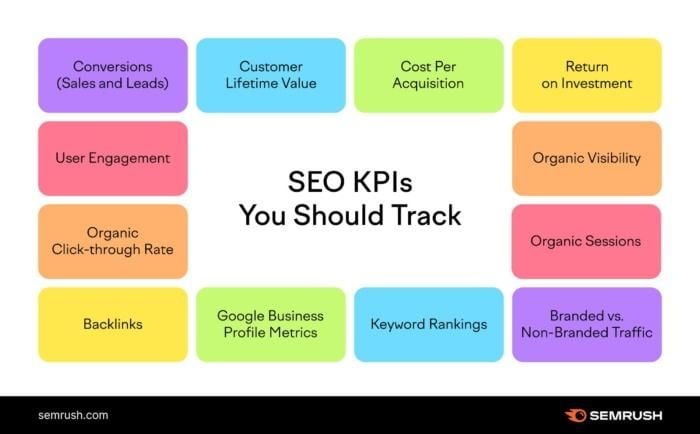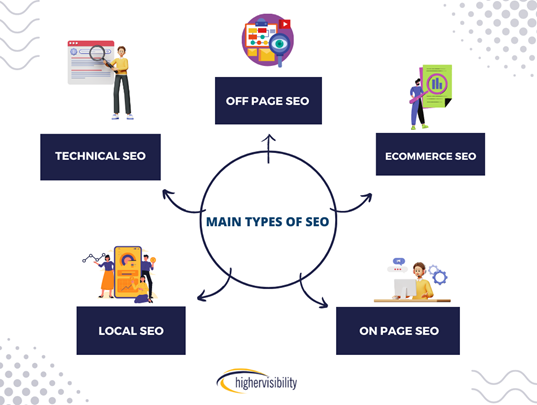Unravel the mystery of SEO with our comprehensive guide! Learn the basics and best practices to boost your online presence.

Image courtesy of via DALL-E 3
Table of Contents
Introduction to SEO
Search Engine Optimization, or SEO in short, is a vital tool that helps websites become more visible online. Imagine if your favorite book was placed at the very bottom of a huge library – you wouldn’t be able to find it easily! SEO helps websites show up on search engines like Google, so people can easily discover and visit them.
What is SEO?
SEO stands for Search Engine Optimization, which means making changes to your website so that search engines like Google can better understand your content. By doing this, your website can appear higher in the search results when people look up information related to your site.
Why is SEO Important?
Websites need SEO to attract visitors just like how a store needs signs to attract customers. SEO makes sure that when someone is looking for something you offer, like a fun game or a helpful article, your website pops up in their search results. It’s like guiding people right to your virtual doorstep!
How Search Engines Work
Search engines are like giant libraries on the internet where you can look up information. They help you find websites, images, videos, and more by typing in words that describe what you’re looking for. Some popular search engines you may have heard of are Google, Bing, and Yahoo.
Crawling and Indexing
Imagine search engines as busy bees that fly around the web, visiting different websites to see what they’re about. This process is called crawling. After the bees visit a site, they store information about it in their database, which is like a huge book with all the websites they have visited. This is called indexing, and it helps search engines quickly find the right websites when you search for something.
Keywords and Their Importance
In the world of Search Engine Optimization (SEO), keywords play a vital role in helping websites attract visitors by making them more visible on search engines like Google. But what exactly are keywords? Keywords are simply the words or phrases that people type into search engines when looking for information. They are like clues that tell search engines what your website is about and help match your content with what users are searching for.

Image courtesy of neilpatel.com via Google Images
Choosing the Right Keywords
When it comes to selecting keywords for your website, it’s essential to brainstorm common words and phrases that accurately describe the content you offer. Think about what words your potential visitors would type into a search engine to find you. By choosing the right keywords, you can increase the chances of your website appearing in search results when people are looking for information related to your content. Remember, selecting relevant and specific keywords is key to attracting the right audience to your website.
On-Page SEO Techniques
One important on-page SEO technique is using keywords in your website’s content. Keywords are the words or phrases that people type into search engines to find information. By including relevant keywords in your content, you can make it easier for search engines to understand what your website is about and rank it higher in search results.
Meta Tags
Another crucial on-page SEO technique involves using meta tags, such as titles and descriptions. These meta tags provide information about your web page to search engines. Titles and descriptions should accurately reflect the content on the page and include relevant keywords to improve your site’s visibility in search results.
Headings and Subheadings
Using headings and subheadings is essential for organizing your website’s content and improving its SEO. Headings help search engines understand the structure of your page and make it easier for users to navigate. By using headings like H1 and H2, you can signal the importance of different sections of your content to search engines.
Off-Page SEO Strategies
Backlinks are like recommendations from other websites to yours. It’s when another website thinks your content is so good that they want to share it with their own readers. These links show search engines that your website is trustworthy and popular because others are talking about it. The more good-quality backlinks you have, the better your site will do in search results.

Image courtesy of trioseo.com via Google Images
Social Media Sharing
Social media is a fun way to share things with your friends, but did you know it can also help with SEO? When you share your website’s content on social media platforms like Facebook, Twitter, or Instagram, you’re showing search engines that people like what you’re sharing. This can boost your website’s visibility and bring more visitors to your site. So, don’t forget to share your awesome content on social media!
Technical SEO
Technical SEO is like the engine under the hood of a car—it ensures that a website runs smoothly and efficiently to impress search engines like Google. Let’s take a closer look at two key aspects of technical SEO: website speed and mobile-friendliness.
Website Speed
Imagine trying to open a door that takes forever to unlock. Frustrating, right? Well, the same goes for websites that load slowly. Search engines like Google prefer websites that load quickly because nobody likes waiting around. So, it’s essential for websites to be fast on all devices, giving visitors a seamless experience.
Mobile-Friendliness
Websites need to be friendly on smartphones and tablets too. Think of your website as a chameleon—it should adapt to different devices easily. With more people using their phones to browse the web, it’s crucial for websites to be easy to read and navigate on mobile devices. This ensures that everyone, no matter the device they use, can enjoy the website without any hassle.
Measuring SEO Success
When it comes to Search Engine Optimization (SEO), it’s important to know whether your efforts are paying off. But how can you tell if your website is getting more visibility on search engines? Let’s explore how you can measure the success of your SEO strategies.
.png)
Image courtesy of statuslabs.com via Google Images
SEO Tools
If you want to track how well your website is performing in search results, you can use SEO tools like Google Analytics. These tools provide valuable insights into your website traffic, showing you where your visitors are coming from and which keywords are driving the most traffic to your site. By analyzing this data, you can see if your SEO efforts are bringing more visitors to your website.
Tracking Progress
It’s important to regularly check how your website is ranking in search results. You can do this by searching for relevant keywords related to your website and seeing where your site appears in the results. Additionally, you can monitor your website’s traffic over time to see if it’s increasing as a result of your SEO efforts. By keeping an eye on these metrics, you can gauge whether your SEO strategies are working effectively.
Best Practices for SEO
When it comes to Search Engine Optimization (SEO), there are certain best practices that can help websites improve their visibility and ranking on search engines like Google. By following these practices, website owners can attract more visitors and increase their online presence.
Consistent Updates
One crucial best practice for SEO is to regularly update your website with fresh and relevant content. Search engines like Google prefer websites that consistently provide new information, as it indicates that the site is active and engaging for users. By adding new blog posts, articles, or product updates, you signal to search engines that your site is valuable and deserves higher visibility.
Quality Over Quantity
Another important aspect of SEO best practices is focusing on quality content rather than sheer quantity. While it’s essential to use relevant keywords in your content to improve search engine visibility, stuffing keywords everywhere can have the opposite effect. Search engines are getting smarter at detecting keyword spamming, so it’s crucial to create content that is genuinely helpful and engaging for your audience. By prioritizing quality over quantity, you can build trust with your readers and improve your website’s SEO in the long run.
Conclusion: Recap of SEO Basics
Understanding SEO basics is crucial for the success of any website. In this article, we have covered various aspects of Search Engine Optimization in simple terms suitable for an 11-year-old reader. Let’s recap the main points we’ve discussed:

Image courtesy of www.highervisibility.com via Google Images
What is SEO?
SEO stands for Search Engine Optimization, which helps websites become more visible on search engines like Google by improving their ranking.
Why is SEO Important?
Websites need SEO to attract visitors and show up in search results when people look for information. It helps websites reach a wider audience.
Keywords and Their Importance
Keywords are words or phrases people type into search engines to find information. Choosing the right keywords is crucial for website visibility and attracting the right audience.
On-Page SEO Techniques
Using keywords in content, optimizing meta tags like titles and descriptions, and utilizing headings and subheadings are key techniques to improve on-page SEO.
Off-Page SEO Strategies
Backlinks from other websites and social media sharing play essential roles in improving a website’s SEO ranking by increasing its authority and relevance.
Technical SEO
Website speed and mobile-friendliness are critical for meeting modern search engine requirements and providing a seamless user experience across all devices.
Measuring SEO Success
Using tools like Google Analytics helps track website traffic and measure the effectiveness of SEO efforts over time, ensuring continuous improvement.
Best Practices for SEO
Consistently updating the website with fresh, quality content and prioritizing content quality over quantity are key best practices for effective SEO.
By following these SEO basics and implementing best practices, website owners can optimize their sites for better visibility, attracting more visitors and achieving their online goals.
Frequently Asked Questions (FAQs)
How Long Does SEO Take to Work?
SEO takes time to work, usually several months. Just like planting a seed and waiting for it to grow into a tree, SEO needs patience before you can see the results. It’s a gradual process of making your website more visible to people searching for information.
Can I Do SEO Myself?
Yes, you can definitely do SEO yourself! With some learning and practice, anyone can start applying basic SEO techniques to improve their website’s visibility. There are plenty of resources and tools available online to help you understand and implement SEO effectively.
Why Didn’t My Site’s Ranking Improve?
If your site’s ranking didn’t improve as expected, there could be a few reasons behind it. Sometimes, high competition in your industry makes it challenging to rank higher. It could also be that you need to adjust your keywords or optimize your content further. Remember, SEO is an ongoing process that requires monitoring and tweaking to see positive results.







